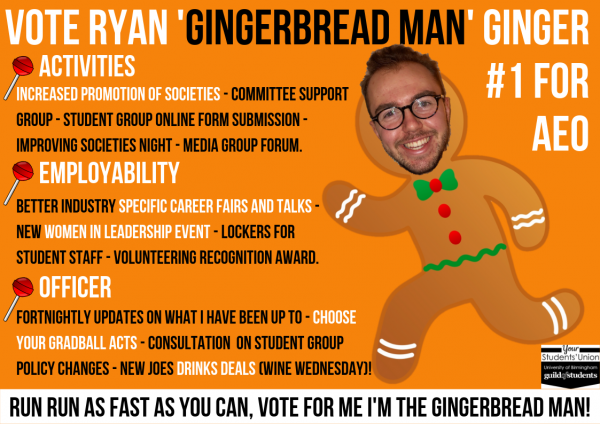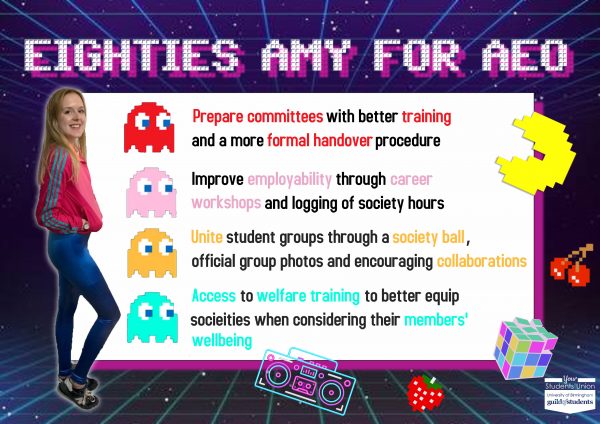
News Reporter Charlotte Gill spoke to the candidates running to be the Guild of Students’ Activities and Employability Officer (AEO) for the 2019-20 academic year to learn about their manifestos
The Activities and Employability Officer (AEO) supports the development of employability skills, working alongside Jobs, Skills & Volunteering (JSV). The AEO also promotes extra-curricular activities while overseeing all student societies.
The candidates running for the position this year are listed alphabetically by their surname on this page. Voting for Guild Elections opens at 10 AM on Monday 25th February and closes at 4 PM on Friday 1st March, with the results announced on Saturday 2nd March. Vote HERE.
Ryan Ginger

Ryan Ginger is a third-year English Literature and American Studies student. Ginger says he has been ‘heavily involved in the Guild’ and believes he could draw upon his wide-ranging experience for the AEO role. He was a member of the Residents’ Association (RA) in his first year and has been Social Secretary of BEDsoc, the English Society. He has had a show with Burn FM for three years.
Ginger is motivated to run for the AEO position to make a positive difference
He also works as a senior assistant at Joe’s Bar, which he says provides an awareness of the ‘commercial aspect.’ Ginger is motivated to run for the AEO position to ‘make a positive difference’ after hearing students’ comments about what could be improved.
One aim is to provide more support for societies, firstly ensuring committees are ‘aware of the support available.’ Ginger wants to implement a consultation period and better downwards communication so that committees are informed of all policy changes and what this signifies. Organising meetings and continuing drop-in hours would allow groups to air their concerns and provide feedback so that the society experience can be improved because ‘at the end of the day, Student Groups is run for the students.’
Ginger suggests introducing workshops to educate societies on how best to spread knowledge of their group. Ginger acknowledges that those who spend time at the Guild are usually already part of a society, so he proposes a podcast, on which groups can explain more about what they do to spread the word beyond the Guild and encourage participation. In addition, Ginger alluded to the possible use of the information boards within the Green Heart.
At the end of the day, Student Groups is run for the students
Ginger wants to make society forms available to view and submit online as a ‘time-saving measure’ for committee members – something he learnt would be useful in his role as Social Secretary. He notes that this would afford groups more time to plan activities, and ‘if the committee is more supported […] this will reflect on the members who would get a better experience as well.’
As for employability, Ginger is ‘really passionate’ about introducing women in leadership events. He also wants more industry-specific fairs and talks to cater for the broad spectrum of departments and societies, creating an opportunity for those unable to get work experience to learn more about the industry and speak to professionals who could provide insightful and practical information for future employment.
He adds that he would like students to be more involved in events, such as suggesting who they would like to perform at GradBall.
Amy Hodgkiss

Amy Hodgkiss is a third-year Psychology student who got involved with the Psychology Society in her second year. She was a Careers Rep, which was then a new role. Hodgkiss developed this throughout the year before deciding to become more involved by running for President of the society, which is the position she currently holds.
Hodgkiss says her motivation to run for the AEO is to improve the all-round society experience after she learnt about the ‘time, effort and passion that goes into running a society.’ In addition, she is part of the Student Groups Executive committee, sitting on a panel alongside Robyn Macpherson, the current AEO.
This recognises society achievement and deals with grants among other tasks, and she believes it has been ‘valuable experience’ in understanding the AEO position.
Hodgkiss wants to offer welfare training to committee members so that they can better support one another and society members
Hodgkiss wants student groups to be more independent by ‘streamlining procedures.’ She would hold a training forum to hear from as many societies as possible. Upon identifying common factors, training days and workshops would be created so that committee members feel more knowledgeable in their roles.
Hodgkiss particularly identified the treasurer role as one which may require training. She recognises that a society is a ‘community’ for its members and wants to offer welfare training to committee members so that they can better support one another and society members.
Collaboration is a large part of Hodgkiss’ policy. She would create opportunities for contact between different categories of groups such as sports groups, academic/departmental groups and media groups. Hodgkiss believes the aforementioned workshops and training days would also ‘bring like-minded groups together.’
She hopes that common problems and experiences can be shared and mutual support can be provided, particularly among committee members for whom the workload can be high. As well as communication between societies, Hodgkiss wants to unite committees with members to a greater degree. She proposes ‘small but realistic’ measures such as group photos like sports teams have.
Logging society activities, which Hodgkiss hinted could complement the Personal Skills Award (PSA), would allow committee members to ‘recognise the skills they are developing’ for future employability. This would involve recording specific activities and the hours totalled to ‘demonstrate dedication.’ Hodgkiss added that these logs could be additionally used to ease the handover process, as the incoming committee members can better understand what the previous committee achieved and how.

Comments